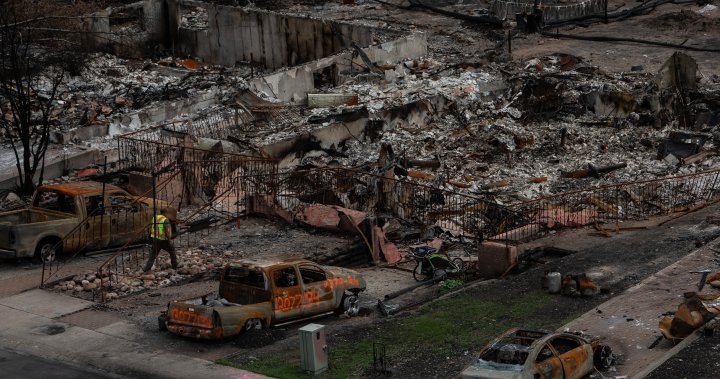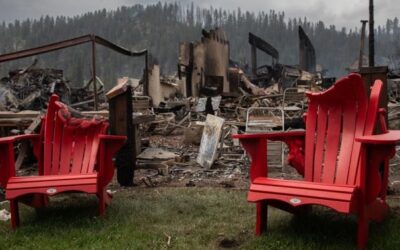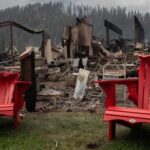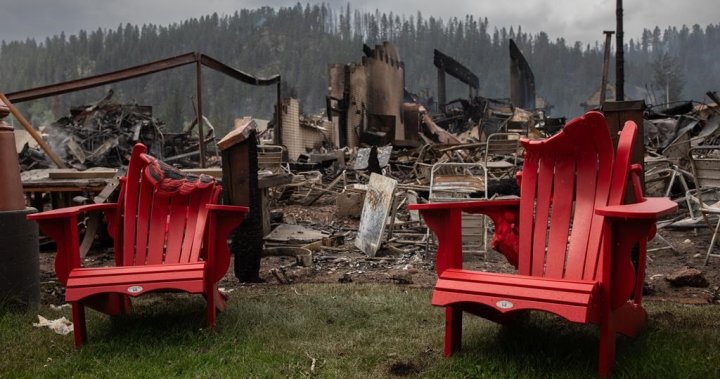Canada has had one of its worst wildfire seasons on record. How bad was it? – National

As summer draws to a close in Canada, the 2024 wildfire season is shaping up to be one of the most destructive on record, largely due to the devastation caused by a blaze that tore through a tourist town in the Canadian Rockies.
In terms of total area burned, the 2024 season ranks among the six worst in the past half-century. Still, 2024 is shaping up to be far less severe than last year—the worst on record—and not as bad as many feared.
The total cost of wildfire damage this year skyrocketed in July, when a third of the popular tourist town of Jasper, Alberta, was destroyed by a blaze. The fire caused an estimated C$880 million ($646.73 million) in insured damage, according to the Insurance Bureau of Canada.
In total, 5.3 million hectares (13.1 million acres) have burned so far in 2024, according to the Canadian Interagency Forest Fire Centre, and more than 600 fires are still burning across the country, mostly in British Columbia.
That makes 2024 the worst season since 1995, with the exception of last year, when a record 17 million hectares burned, releasing more carbon than some of the world’s biggest carbon-emitting countries.
The wildfire season in Canada typically runs from April, when the snow melts, to September or October, with peak activity in July and August. Climatologists predict that average temperatures will rise in Canada as the planet warms, leading to longer and more destructive wildfire seasons.
In April, the Canadian government warned that 2024 could be another “catastrophic” wildfire season due to persistent drought in the western provinces and predictions of a warmer-than-average summer.
“We were preparing for what could have been as bad a year as 2023,” said Christie Tucker, Alberta’s wildfire information officer, adding that the province had added a third night-vision helicopter, hired about 100 more firefighters and declared an early start to the 2024 season as a precaution.

Get the latest national news
For news that impacts Canada and the world, sign up to receive breaking news alerts directly when it happens.
But dry conditions in June and July and an unusually high number of lightning-caused fires still sparked hundreds of blazes across the province, including the one that hit Jasper.
“It’s had a significant impact on everyone in Alberta,” Tucker added.
The threat of nearby wildfires prompted Suncor Energy, Canada’s second-largest oil company, to cut production at its Firebag site in northern Alberta, but the impact on oil supplies was far less than in some previous summers.

Wildfire agencies also had to deal with dozens of so-called zombie fires that broke out last summer and burned throughout Canada’s long winter.
“I’ve never seen a year like this, where there were so many fires that were caused by a previous year. Some of them were the size of Prince Edward Island, they were just massive,” said Mike Flannigan, a wildfire expert and research chair at Thompson Rivers University in British Columbia.
Prince Edward Island, one of Canada’s Maritime provinces, has an area of 566,000 hectares, roughly the same size as the Toronto metropolitan area.
Flannigan estimated that nearly half a million hectares, or nearly 10%, of Canada’s burned land in 2024 was due to the 2023 winter fires.
Fewer evacuation orders and less widespread smoke — which affected millions of people in the northeastern United States and Canada last year — have contributed to the perception that 2024 has been a milder year for wildfires.
Kira Hoffman, a postdoctoral researcher and wildfire ecologist at the University of British Columbia, said western Canada was helped by a period of cooler weather in late August that dampened some of the fire activity, but by historical measures, 2024 has still been a very destructive season.
“It’s this shifting baseline syndrome. Last year was so bad that this year we think only a third of these fires are pretty good,” she added. “But there’s nothing normal about that.”
Many experts warn that the trend toward longer periods of very hot, dry “fire weather” and increasingly intense wildfire seasons will continue due to climate change.
“If you look at the total area burned or the number of wildfires from year to year or the total damage from wildfires, it goes up and down, but if you draw an average trend line, it’s all going up,” said Ryan Ness, director of adaptation at the Canadian Climate Institute.



















